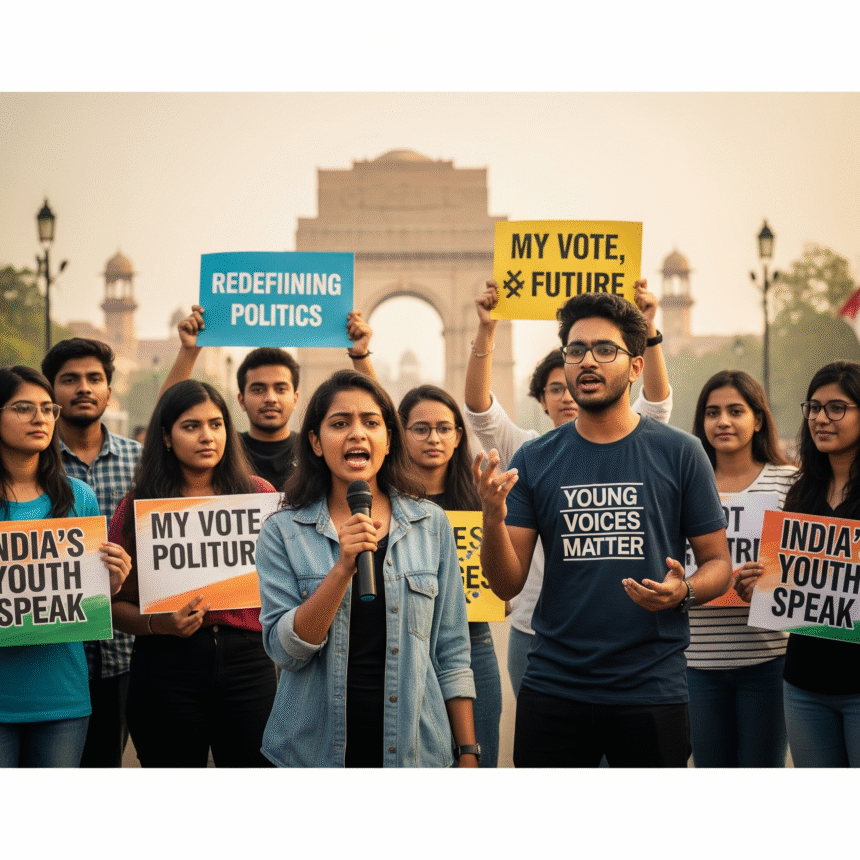Exploring the Role of India’s Youth in Shaping Democratic Processes Through College Politics and Beyond
Key Metrics:
- Youth Demographics: Nearly 65% of India’s population is under 35, making it one of the youngest nations in the world.
- Voter Turnout: First-time voters played a significant role in the 2019 general elections, with youth turnout increasing by over 10% compared to 2014.
- Student Unions: Organizations like the National Students’ Union of India (NSUI) and Akhil Bharatiya Vidyarthi Parishad (ABVP) represent youth interests in college politics.
- Digital Engagement: Over 400 million young Indians are active on social media platforms, driving conversations on governance and policy.
News Body
India’s youth are not just the future—they are the driving force of its democracy today. With over two-thirds of the population under 35, their voices have the power to shape governance, policies, and public discourse. College politics, social movements, and digital platforms provide young Indians with avenues to engage in the democratic process, challenging traditional norms and redefining political participation.
The Role of College Politics in Shaping Leaders
College campuses have long been the crucibles of political thought and activism in India. From the pre-independence era to contemporary times, student unions and college elections have produced leaders who went on to play significant roles in national politics.
Organizations like the National Students’ Union of India (NSUI), affiliated with the Indian National Congress, and the Akhil Bharatiya Vidyarthi Parishad (ABVP), linked to the Rashtriya Swayamsevak Sangh (RSS), have been instrumental in mobilizing youth around key political and social issues.
In recent years, student protests on issues like tuition hikes, environmental policies, and freedom of expression have showcased the ability of young voices to challenge authority and demand accountability. These movements underline the importance of college politics as a training ground for civic leadership and political engagement.
Youth as Catalysts for Change
India’s youth are increasingly stepping up to demand policy reforms and transparency in governance. Initiatives like Fridays for Future India, led by young environmental activists, and student-led campaigns for mental health awareness highlight the diverse areas where youth voices are making an impact.
The increasing voter turnout among young Indians in the 2019 general elections demonstrates their growing interest in shaping the political landscape. First-time voters are no longer passive participants; they are questioning candidates, advocating for issues like climate action and education reform, and holding leaders accountable.
The Digital Revolution and Political Engagement
Social media has revolutionized political engagement for India’s youth. Platforms like Twitter, Instagram, and YouTube serve as spaces for discussion, activism, and mobilization. Hashtags like #StudentsProtest and #YouthForChangehave united young voices across states, creating a collective platform for raising issues.
However, the digital realm also presents challenges, including the spread of misinformation and the risk of echo chambers. Promoting media literacy and critical thinking is essential to ensuring that young voices remain informed and impactful.
Challenges in Youth Participation
Despite their potential, India’s youth face significant barriers to political participation. High entry costs for elections, lack of mentorship, and the dominance of dynastic politics discourage many young aspirants. College politics, too, has become increasingly polarized, with ideological divides sometimes overshadowing constructive dialogue.
Additionally, rural youth often lack the same access to platforms and opportunities as their urban counterparts, creating disparities in representation and engagement.
The Path Forward
To truly harness the power of young voices, India must create more inclusive platforms for political engagement. Strengthening college elections, providing mentorship programs for aspiring leaders, and expanding civic education can help bridge gaps in participation.
Digital platforms should be leveraged to amplify rural youth voices, ensuring a more equitable representation of diverse perspectives. Political parties must also prioritize youth inclusion, not just as campaign tools but as decision-makers in policy formulation.
Conclusion
Young voices matter because they are the architects of India’s democratic future. From college campuses to digital platforms, the energy, creativity, and passion of India’s youth are redefining political engagement and challenging the status quo.
By empowering young Indians with the tools, platforms, and opportunities to participate meaningfully, India can ensure that its democracy remains vibrant, inclusive, and forward-looking. In the hands of its youth, India’s democratic spirit continues to evolve, setting the stage for a transformative and dynamic future.


Leave a Reply